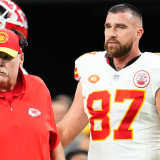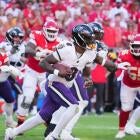
Jadeveon Clowney signing is the latest example of first-rate roster construction by Andrew Berry
Why Cleveland's process has inspired confidence in the organization's future

The Cleveland Browns had been the model on how not to run a franchise since their rebirth in 1999. But now, thanks to general manager Andrew Berry, the Browns find themselves in unfamiliar territory. The team's decision-making has been widely praised over the past two offseasons because of a clear and disciplined strategy orchestrated by GM Andrew Berry.
PFF's Mike Renner wrote a great article on using free agency for need and adding value through the draft. Cleveland signed tight end Austin Hooper and offensive tackle Jack Conklin to fill vital roles on the roster. Although some felt that the Hooper deal came at a premium, the Conklin deal was a bargain considering his contributions as a vital member along one of the league's best units.
Linebacker B.J. Goodson, safety Karl Joseph, cornerback Kevin Johnson, defensive tackle Andrew Billings, safety Andrew Sendejo, wide receiver Jojo Natson and edge rusher Adrian Clayborn were all signed in the first wave of free agency. Clayborn was the only one signed for more than one year. All were short-term, cost controlled deals that simultaneously gave the team long-term financial flexibility and viable starting options at almost every position.
During the period between free agency and the draft, the team re-signed edge rusher Myles Garrett to a league-pacing deal in terms of practical guaranteed money. Garrett had two years remaining on his rookie contract and many questioned the motive behind signing him so early. It was literally a matter of weeks before Los Angeles gave Joey Bosa a deal that surpassed Garrett in regards to average annual value ($25 million per year) and guaranteed money at signing. It was likely a play to get ahead of T.J. Watt's contract as well. The contract extension looks pretty good now. The Texas A&M product was averaging a sack per game before his battle with COVID-19.
Cleveland then added Alabama offensive tackle Jedrick Wills in the first round of the 2020 NFL Draft to fill the largest remaining need on the roster. With the No. 10 overall pick, the team was pretty comfortable with the idea that at least one of the top four offensive tackles would be available to them. Once filled, Berry was able to follow the big board and select the best players available, such as Florida Atlantic tight end Harrison Bryant, Washington center Nick Harris, Missouri defensive tackle Jordan Elliott, Michigan wide receiver Donovan Peoples-Jones and LSU linebacker Jacob Phillips; all of whom contributed in some capacity last season. Second-round safety Grant Delpit out of LSU was hurt in the weeks leading up to the season. NFL Media ranked the Browns as having the fifth-best draft class following the season.
The roster constructed was certainly not finished but it was much improved over the prior year. First-year head coach Kevin Stefanski and his coaching staff overcame complications brought on by COVID-19 and various injuries to lead Cleveland to an 11-5 record and the franchise's first playoff victory since 1994.
With optimism at an uncomfortably high level for those accustomed to the AFC North franchise serving as a doormat, the intrigue surrounding Berry's encore performance in 2021 was palpable. The Browns had a healthy amount of salary cap space but had to be strategically aggressive as to not compromise future goals.
Similar to 2020, Cleveland threw a lot of money at key weaknesses, namely safety and cornerback with the signings of John Johnson III and Troy Hill. The way those deals were structured allowed the team to continue its pursuit of other complementary pieces while maintaining long-term flexibility. The reality is that teams can not afford to keep blue-chip players at every position. For every Garrett, there needs to be a handful of reasonable deals to counterbalance the salary cap.
Where Berry has been smart is that he has been able fill holes on the roster without breaking the bank. Rather than adding a Garrett that is capable of doing everything at a high level, the team signed edge rushers Takk McKinley and Jadeveon Clowney. McKinley is primarily known for his pass-rushing flashes whereas Clowney has been a consistent run-stopping presence. The total value for those two players in 2021 is roughly $12.25 million; otherwise known as half of Garrett's average annual value once it takes effect in 2022 when the salary cap is expected to start rising precipitously on the back of new league television deals.
A similar strategy has been applied at defensive tackle. Billings has been known more for his run-stuffing potential and incoming free agent Malik Jackson is known for his pass-rushing production at this stage of his career. By rotating in and out on downs where it makes sense, they stay fresh and are put in a position to play to strengths. The cost of those two deals is roughly $7.1 million.
To give another example, NBA fans have adopted the big three to describe a team's approach to adding three elite talents and then surrounding them with role players. The Browns have been adding elite talents, but they are also surrounding them with role players to mask deficiencies while not over-leveraging themselves long-term.
Berry also retained wide receiver Rashard Higgins -- a close friend of Baker Mayfield and a reliable contributor in the aftermath of Odell Beckham Jr.'s injury -- and signed linebacker Anthony Walker, which was obviously a big loss for the Colts based on the social media reaction of Darius Leonard. The AFC contender was able to add a leader and great communicator to an area of the roster that needed depth.
When looking at the Browns' roster now, every question has been met with an answer. Cornerback, opposite Denzel Ward, is very reliant on the health of Greedy Williams and could be argued as a remaining need so do not be surprised if Berry adds another player to that room as well before the draft.
If Cleveland intended to sign for need and draft for value, then it has been mission accomplished. With nine picks in the 2021 NFL Draft, including four in the first two days, the organization has significant ammunition to move around and take advantage of value. There has never been a mistake-free organization when it comes to player selection but Cleveland has a narrow vision as to what the team covets in terms of skill sets and culture fit.
All of that is to say this: the Browns are not the favorite to win the Super Bowl but they have improved this offseason and are following a process that makes sense. As long as the team's dealings operate within the guardrails, they should be in a position to consistently compete. It is a welcome change for a franchise defined by turnover and draft busts over the past two decades.
The focus will soon turn to player retention and that stage because rent is coming due on quarterback Baker Mayfield, running back Nick Chubb, offensive guard Wyatt Teller, cornerback Denzel Ward and others. It will be interesting to see Berry's approach to those contract negotiations.


















